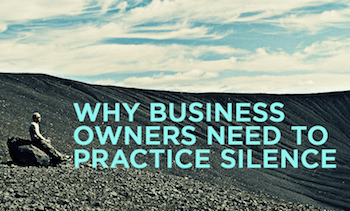Why business owners need to practice silence
I’ve always respected those folks we describe as “the strong, silent type”. You know, the “wise and mature leader” who commands a room with a glance, or communicates it all with a subtle facial expression. These folks have an economy with words that suggests deep thinking. The fact that they use words so sparingly makes those words all the more valuable. I think of Teddy Roosevelt’s “Speak softly and carry a big stick“ approach.

I’m not known as that kind of person. I talk a LOT. And I’m loud. And I’ve got resonance – that’s the kind of voice that carries two blocks if I’m just mildly happy to see someone. Between energy, volume, and stuff to talk about….let’s just say I’ve been known to dominate a room. I’m also not shy with my opinions either. If I have one, you likely know what it is. So it should come as no surprise that it hasn’t been my habit to leave much silence in business conversations. While one person’s talking, I’m planning my response. It’s more efficient, and it keeps conversation flowing. Silence has always seemed, at best, a waste of time, and at worst, kind of awkward.
But lately I’ve been experimenting with leaving a bit more silence.
Leaving space for silence gives a weight and respect to another person’s words that is surprising. When my first response to your concern, question or assertion is silence, instead of experiencing my alternative argument being blasted back at you, you get a chance to witness my careful consideration of what you said.
In silence, I am a better listener. When I’m not preparing my retort, I am free to listen clearly. And, the person I’m talking with feels heard; they also are likely to feel more understood. They definitely feel more significant. I’m communicating respect for them with my silence.
Silence gives everyone a chance to pause, reconsider, and perhaps ratchet down their clamoring emotions. I’ve learned this by applying silence to business meetings (gasp). In high-stakes, highly charged meetings, when discussions begin to look more like arguments, I have tried introducting a “time out”– where silence is imposed on everyone. In the silence of a time out, I have found I can sometimes “hear” the concerns of both sides more clearly; much more clearly than in the midst of words flying back and forth, loaded with emotion.
Thinking about this exercise has helped me to appreciate silence as a facilitation tool. When the issue at hand is polarizing– or just heated — tension, tempers, and conflict can escalate quickly. Sure, we can always “hear each other out“; but I have found that the hidden agenda in those kind of meetings is too often “wait for the chance to prove MY point or assert MY ideas, solutions, etc..” Quickly expressing counter opinions forces everyone to play defense; and has the risk of actually increasing the gap of understanding.
When I hear someone vehemently championing an idea that I feel needs to be questioned (and that, I’m guessing, they might have some doubts about), leaving silence — instead of instantly responding with a counter argument — leaves time and space for them to express their doubts and perhaps even soften their opinion. Silence leaves room for people to breathe; silence says “you are not under attack”. When we are purposeful with silence — especially in the midst of conflict — it makes room for outcomes we often couldn’t have imagined.
In those moments when I feel panicked, or my own rising temper, silence helps me get a grip. First of all, when I’m silent I can notice my blood pressure rising; silence gives me the opportunity to take a breath, reflect on what is triggering me, and consider a course of action that isn’t driven by emotion. A commitment to keep silence gives me time to slow my heart rate, and get back in my right mind.
But silence is hard to come by these days. Because we so rarely experience silence, especially in business conversations, it can make people uncomfortable. They may rush in to fill it, and say more than they planned to — for better or for worse. But it will also help you to avoid responding too quickly and saying something you might regret. Another great opportunity for silence is when you offer a price to a prospect. I’m always tempted to justify or qualify my prices, but I’ve found that just putting the price out there and then being silent gives it a certain weight, and leaves room for the prospect to react before I start justifying and negotiating (with myself).
There is a reason the archetype of the “strong, silent type” exists. And that’s because there is a real power, or status component, to silence. I used to feel that the person who did all the talking held the power position — but when I stopped talking, I learned the power that can come through silence.
Let’s go back to a sales situation. When a sales person is hawking their wares, engaging them in conversation draws you in. But remaining silent can be un-nerving for them. Or in “difficult” conversations, when you notice the other person shucking-and-jiving and trying to defend themselves, engaging in that dialogue gives it weight — you can get caught up in their “stinkin’ thinkin'”. If you just leave silence, you can make your point without giving energy and focus to those efforts to deflect, blame, or avoid.
Can it get awkward? Sure. But the more time I spend with it, the more I experiment with it, the more convinced I am of the superior power of silence. It conveys respect and significance, it builds relationships and understanding, and it opens the door to unimaginable solutions.

How have you experienced the power of silence?

Could your leadership range restrain
the growth of your business?
Take our self-leadership assessment to identify opportunities
to grow your leadership (which could grow your business).
Get your results instantly without entering your email address.